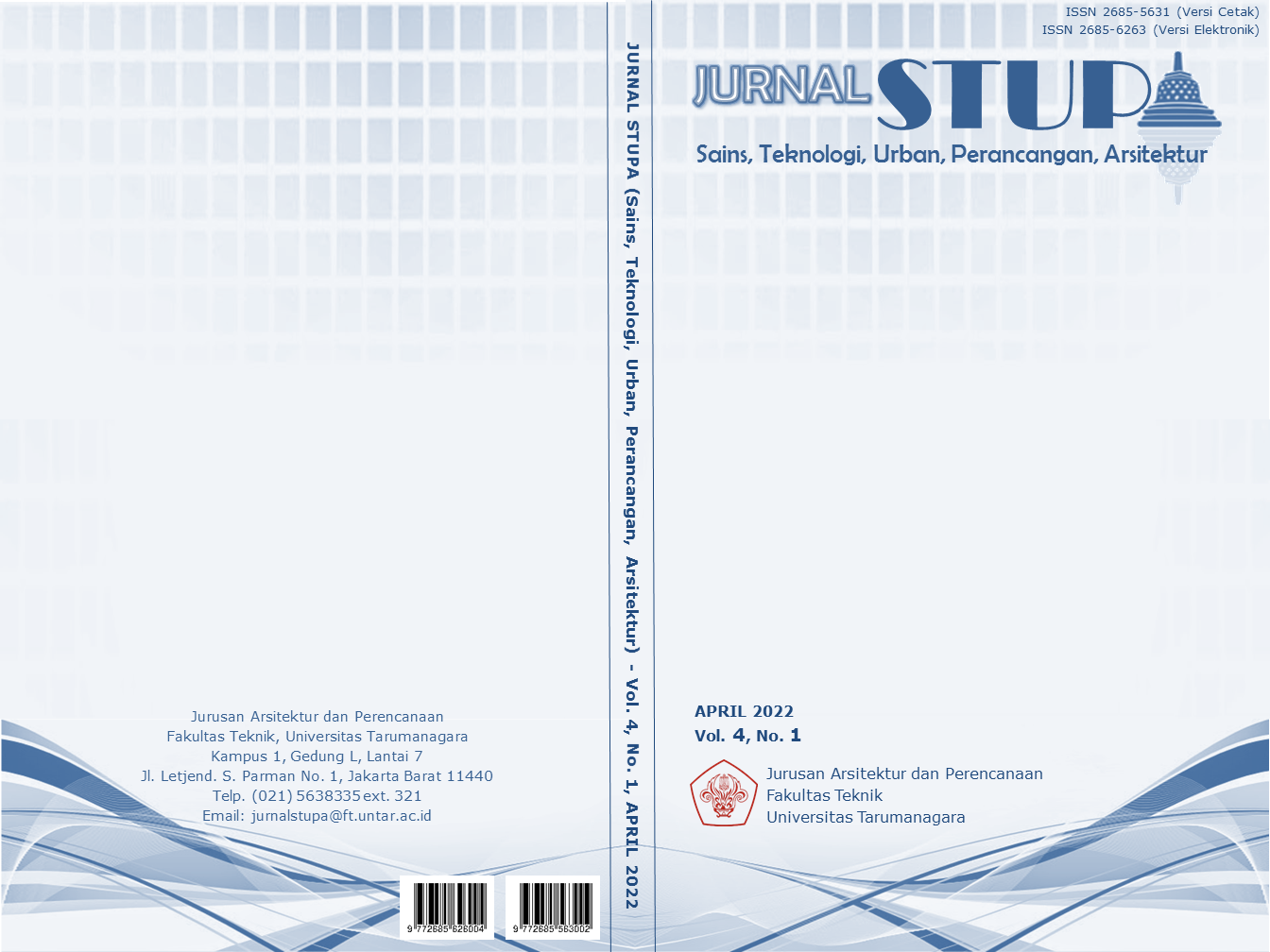PERUBAHAN UNTUK HUNIAN VERTIKAL UNTUK PERUBAHAN GAYA HIDUP PASCA PANDEMI
Main Article Content
Abstract
With the emergence of the COVID-19 pandemic in 2020, people are forced to avoid direct contact activities due to pandemic rules not to avoid direct contact with each individual. This makes people carry out their daily activities remotely through electronic devices using the internet. After carrying out remote activities for almost 2 years, people are starting to get used to remote activities and feel more comfortable in carrying out important daily activities because of the benefits of doing online activities that don't need to take a lot of time (no traffic jams, travel costs). , etc.) which makes it possible for the implementation of these remote activities to be carried out in the long term after this pandemic is over or subsided. With the change in the function of the house as a place to work, go to school, and shelter, important activities such as work/study can be disrupted because these activities become a distraction for each other, therefore adaptation is also needed to the arrangement of the home space (vertical) and the program so that activities in homes do not interfere with each other and important activities that are carried out remotely (work/study) are not disturbed and the results of the quality of the activities are decreasing which is to adapt to new lifestyle changes that lead to digital and long-distance contacts in the future to avoid distraction from these activities that interfere with their productivity and quality.
Keywords: COVID-19 pandemic; distraction; lifestyle changes; productivity.
Abstrak
Dengan munculnya pandemi COVID-19 pada tahun 2020 ,masyarakat terpaksa untuk menghindari aktivitas secara kontak langsung karena aturan pandemi untuk tidak menghindari kontak langgsung terhadap masing-masing individu. Hal tersebut membuat masyarakat melakukan aktivitas keseharianya secara jarak jauh melalui perangkat elektronik degan menggunakan internet . Setelah berlangsungnya kegiatan secara jarak jauh selama hampir 2 tahun, maka masyarakatpun mulai terbiasa dengan kegiatan secara jarak jauh dan merasa lebih nyaman dalam melakukan kegiatan penting sehari – harinya karena manfaat berkegiatan secara online yang tidak perlu memakan waktu banyak ( tidak ada kemacetan jalan, ongkos berpergian, dll) yang hal ini memungkinkan untuk penerapan kegiatan secara jarak jauh tersebut dilakukan secara jangka panjang setelah pandemi ini selesai atau meredah. Dengan perubahan fungsi rumah sebagai tempat bekerja, bersekolah, dan hunian maka kegiatan penting seperti bekerja/belajar bisa terganggu karena kegiatan tersebut manjadi distraksi bagi satu-sama lainnya, oleh maka itu dibutuhkan juga adaptasi terhadap penyusunan ruang rumah(vertikal) dan programnya agar kegiatan dalam rumah saling tidak mengganggu satu sama lainnya dan kegiatan penting yang dilakukan secara jarak jauh (bekerja/belajar) tidak terganggu dan hasil kualitas kegiatannya pun makin berkurang dimana untuk menyesuaikan dengan perubahan gaya hidup yang baru yang mengarah ke arah digital dan kontak jarak jauh kedepannya untuk mengindari distraski terhadap kegiatan tersebut yang mengganggu produktivitas dan kualitas nya.
Article Details
References
Gorlick, Adam. “The productivity pitfalls of working from home in the age of COVID-19” www.stanford.edu. Diakses pada 8 Agustus 2021.
Koolhas, R dan Bruce M. (1995). S, M, L, XL. New York : The Monacelli Press.
Kuntscher, M. (2010). Typology+: Innovative Residential Architecture. Basel : Birkhauser Verlag AG.
Panero, J. dan Martin Z. (1979). Human Dimension and Interior Space A Source Book of Design Reference Standards. New York : United States and Canada by Whitney Library of Design.
Neuferst, E. (1998). Architect Data. German : Bauwelt-Verlag.
Sutanto, A. (2021). STUPA 8.32 Berpikir Ulang Tipologi. Jakarta: Universitas Tarumanagara.
Ballard, J. “Most remote employees don’t want to return to the workplace after the pandemic” www.yougov.com. Diakses pada 8 Agustus 2021
Choi, I. “US students are failing at frightening levels during the pandemic. We know Fs 'disproportionately punish' students with 'weaker safety nets', but experts can't decide what to do.” www.insider.com. Diakses pada 9 Agustus 2021.
https://www.insider.com/us-students-failing-grades-during-pandemic-experts-torn-2020-12
Jones, L dan Rebecca W. “Most workers do not expect full-time office return, survey says” www.bbc.com. Diakses pada 20 September 2021.
https://www.bbc.com/news/business-58559179
Smith, M. “One in five want to work from home full time after the pandemic” www.yougov.co.uk. Diakses pada 20 September 2021.
McKendrick, J. “So Far, So Good With Work From Home: Should It Be Permanent?” www.forbes.com. Diakses pada 20 September 2021.
Glaeser, E. dan David Cutler. “ You may get more work done at home. But you’d have better ideas at the office.” www.washingtonpost.com. Diakses pada 20 September 2021.
https://www.washingtonpost.com/outlook/2021/09/24/working-home-productivity-pandemic-remote/
Swaminathan, Aarthi. “Remote learning led to lower K-12 test scores in some U.S. states, especially for math, study finds” www.yahoo.com. Diakses Pada 21 September 2021.
Bailey, C. “4 types of distractions that derail your productivity” www.alifeofproductivity.com. Diakses pada 21 September 2021.
https://alifeofproductivity.com/4-types-of-distractions-that-derail-your-productivity/
S. Pang, Alex. “So, What Is Distraction Again?” www.psychologytoday.com. Diakses pada 24 September 2021.
https://www.psychologytoday.com/us/blog/rest/201602/so-what-is-distraction-again
Forster, S. “Distraction and mind-wandering under load” www.frontiersin.org. Diakses pada 24 September 2021.
https://www.frontiersin.org/articles/10.3389/fpsyg.2013.00283/full



